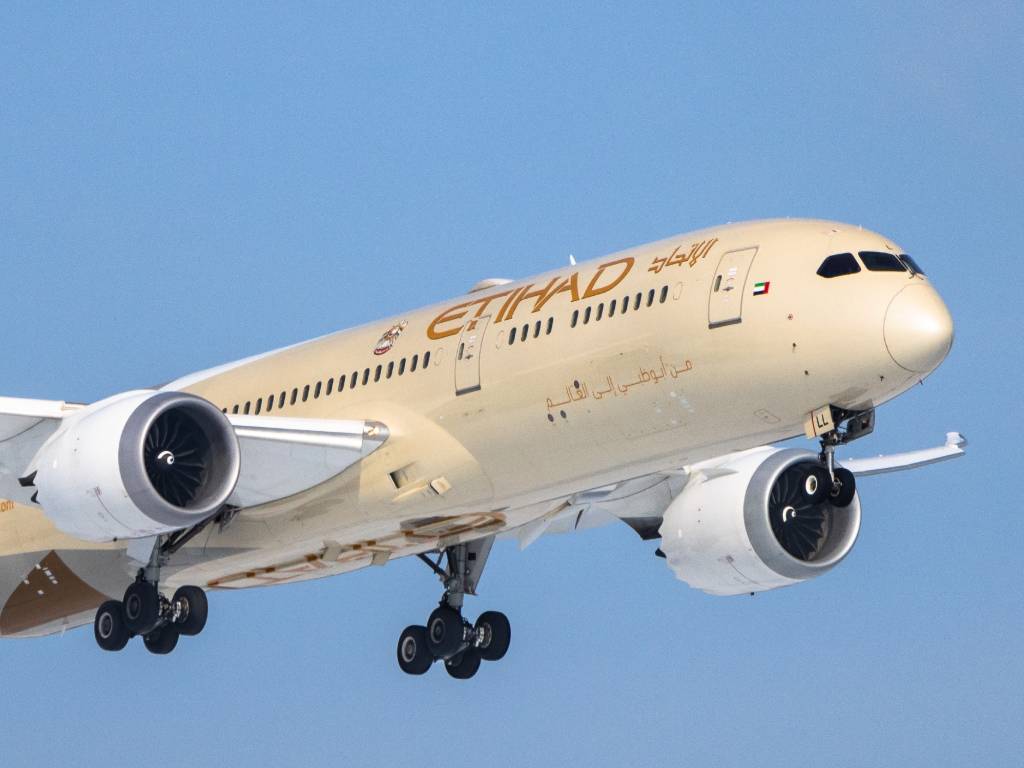Etihad Airways to eliminate condensation trails on net-zero flight to Egypt’s Cop27
Flight scheduled for Sunday will be powered entirely by sustainable aviation fuel.
The airline’s net-zero flight, scheduled for Sunday, will be operated on its Boeing 787 “Greenliner”.
The flight, part of the Etihad’s sustainability push, will feature Satavia’s contrail avoidance technology, Etihad said on Thursday.
Aircraft contrails — vapour trails produced by the exhaust from jet engines — heighten the effect of global warming. Contrails cause up to 60 per cent of aviation’s total climate impact, equivalent to 2 per cent of all human impact.
The collaboration between Etihad and Satavia “demonstrates the possibility of dramatic sustainability advances in day-to-day commercial operations”, Mariam Alqubaisi, Etihad’s head of sustainability and business excellence, said.
This means Etihad will buy — or book — SAF for the flight provided by fuelling partner World Energy.
The flight will use conventional Jet-A1 fuel, while the physical SAF that Etihad has purchased will be delivered to the Los Angeles International Airport (LAX) fuel system to be used on flights by other airlines. LAX has the infrastructure to take delivery of and distribute World Energy’s SAF.

Etihad has already committed to a target of net-zero carbon emissions by 2050 and halving its 2019 net emission levels by 2035.
The UAE has also pledged to reduce its carbon emissions to net zero by the year 2050, earmarking Dh600 billion ($163.37bn) for investments in clean and renewable energy sources over the next three decades.
“By implementing minimal changes to a small percentage of flights, eco-conscious operators like Etihad can eliminate the majority of their non-carbon dioxide climate footprint with essentially no impact on day-to-day operations,” Adam Durant, Satavia’s chief executive, said.
“For transatlantic operations, up to 80 per cent of contrail climate impact can be avoided by rerouting just over 10 per cent of flights.”
Since 2019, when the Greenliner programme began, Etihad and Boeing have operated several flights aboard the 787 Dreamliner jet, focusing on plastic-free in-flight products, optimised airspace management, flight deck tools for eco-friendlier take-offs, noise reduction and the use of SAF.
Etihad is also using its new A350 passenger jet as part of the programme aimed at decarbonising aviation.
Last year, airlines globally pledged net-zero carbon emissions from their operations by 2050, bringing the air transport industry in line with the objectives of the Paris Agreement to limit global warming to 1.5°C above pre-industrial levels.
The airline industry is facing pressure from environmental groups to lower their carbon footprint and make operations greener after the Covid-19 pandemic.
Science has established beyond doubt that the window for action is closing rapidly. In November 2022, Egypt will host the 27th Conference of the Parties of the UNFCCC (COP27) in Sharm El-Sheikh, with a view to building on previous successes and paving the way for future ambition.
A golden opportunity for all stakeholders to rise to the occasion and tackle effectively the global challenge of climate change facilitated by Egypt on the African continent.







